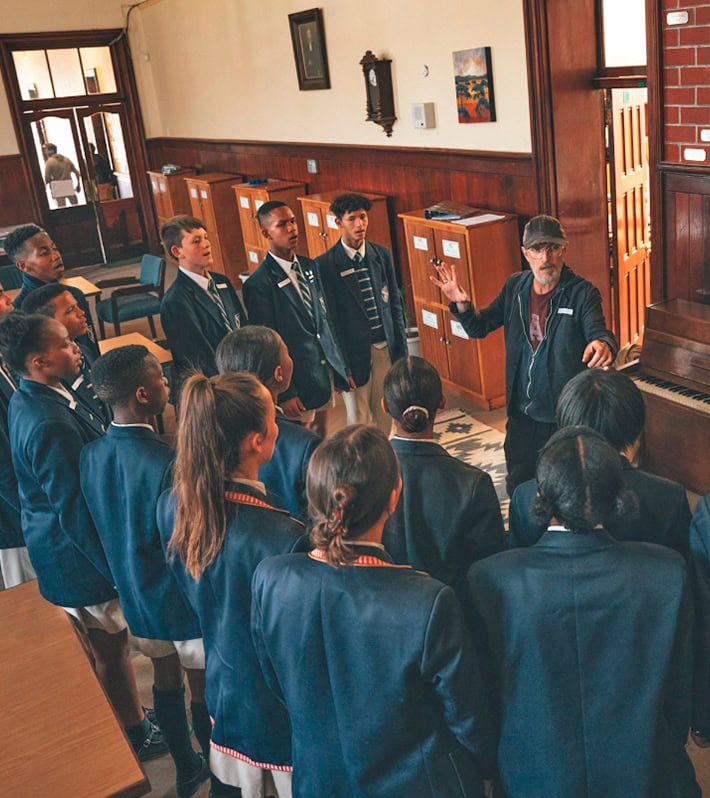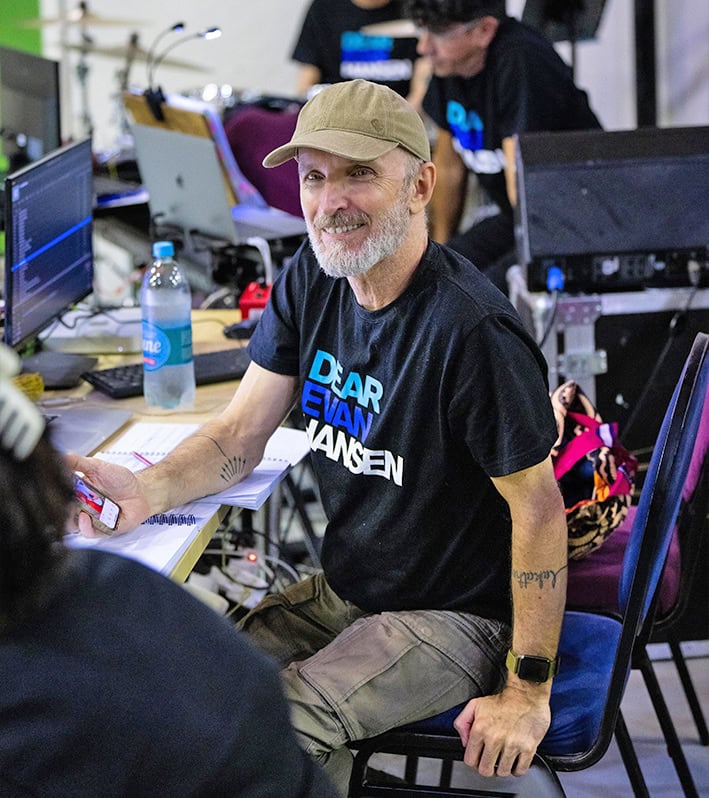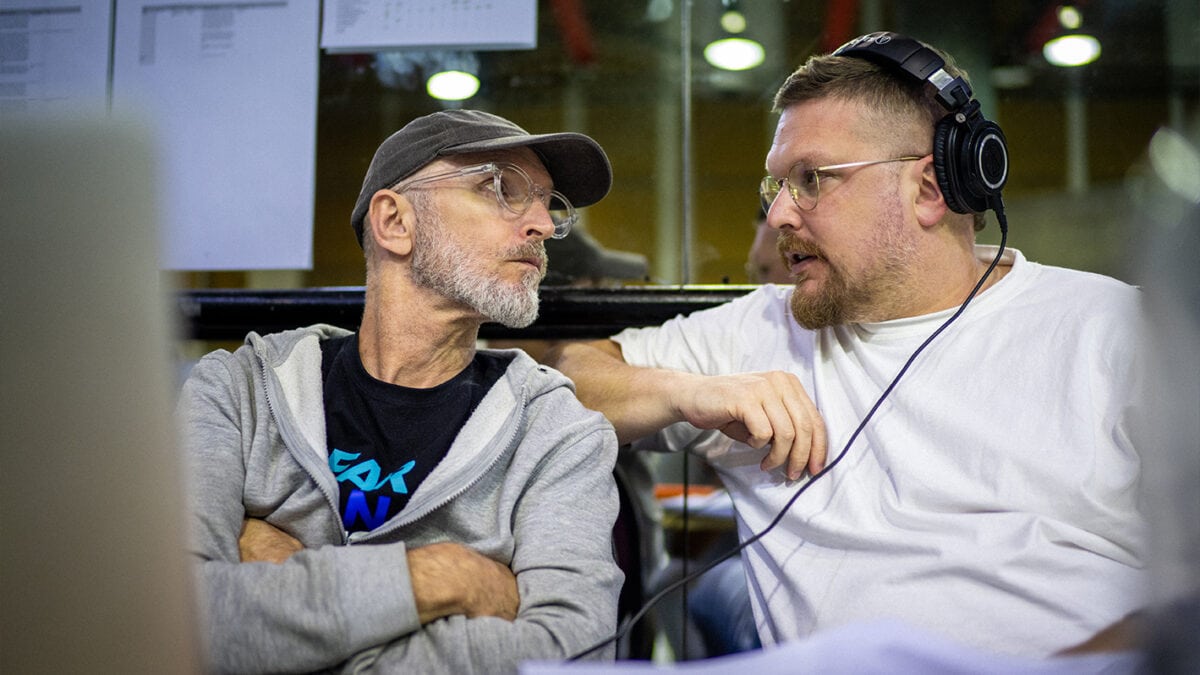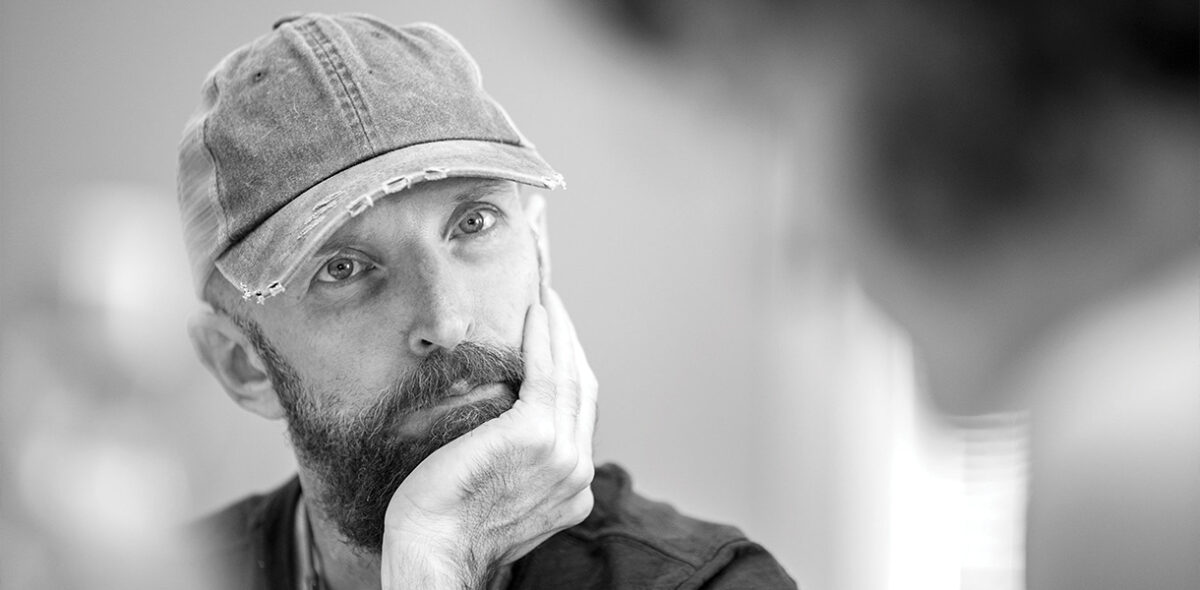Haunting, enigmatic, ethereal… With its sweeping strings, eerie build-ups and undercurrent of mystery and tension, the original music from the eight-part crime series White Lies is a collaboration between Charl-Johan Lingenfelder and composer Edward George King. What’s unique is that the soundtrack for this South African television series was released as an album.
At the time of its creation, Lingenfelder was – as is often the case – working on multiple projects. After full days in the studio, he’d go straight to the theatre for performances of The Promise, a stage adaptation of the Booker Prize-winning novel by South African author Damon Galgut. Lingenfelder was responsible for the play’s innovative sound design, which involved weaving together music, sounds and atmospheric effects to create a sophisticated and immersive sonic environment that gave the production a cinematic quality.
Effulgent, inquisitive and relentless in his search for answers, Lingenfelder goes by many titles: composer, sound designer, musical director, creator of soundscapes. He’s as much at home playing the accordion as he is in the recording studio, or twiddling knobs on mixing consoles that orchestrate the elaborate intermingling of sounds and music for live shows.
Occasionally he’s a filmmaker, too. During Covid-19’s isolating lockdown, he made a short stop-motion animation movie, tellingly titled I’m not here, which went viral online. It expressed solidarity with artists suffering from a sense of futility and lack of income while being stuck at home and, at the same time, it captivated many with its close-to-the-bone expression of isolation, tinged with undertones of hope.
Since the end of the pandemic, he’s been busier than ever. Last year, following the lengthy sell-out season of Mamma Mia, he created the soundscape for a new one-man stage play, Moffie, which played in London. He also collaborated on the score for Mother City, a hard-hitting documentary about the battle for affordable housing in Cape Town. And there was the riveting soundtrack for an Afrikaans production of Hedda Gabler (which returns to the Baxter theatre this May), and his more recent job as music supervisor for the massive musical, Dear Evan Hansen, which features a small live orchestra.


Lingenfelder on the set of the semi-biographical film Kanarie and working behind the scenes on Dear Evan Hansen.
A life of relentless creativity and being permanently in demand has kept Lingenfelder busy beyond measure. His résumé regularly confounds overseas industry professionals who say the tally of productions he’s worked on doesn’t compute with the amount of time that should be available to anyone in his position; there’ve been over 300 projects in the 30-odd years of his professional career.
Working the way he does would be unprecedented in New York or London, where a single stage musical can run for years at a stretch. But in South Africa, the rapid turnaround of entertainment projects ensures a far faster pace, the prevailing hustle culture ensuring that the maximally talented never get too comfortable in a single job. Lingenfelder says moving on quickly to new productions is good for his constitution, a way of allaying boredom, which is perhaps the thing he fears most.
‘It’s about the willingness to slog it out,’ he says, ‘and remind myself that if I don’t do this work I’m going to be so bloody bored.’
He fears that young people today don’t understand what it means to be bored. And he worries that, without the threat of boredom, the impulse to create and be productive, to be curious and discover things for ourselves, may disappear. ‘Boredom doesn’t exist anymore because there are too many distractions,’ he says. He believes we have too much at our fingertips, too many ways to effortlessly escape.
Lingenfelder says he’s lucky to have grown up in a small town at a time – the late-70s and early-80s – when being bored was a genuine threat. ‘TV was still such a small part of our lives, but boredom loomed large. You had to find ways to entertain yourself, and figure things out for yourself, too.’
Not that he waited for boredom to strike before the music gene revealed itself. His mother used to say that as a baby in his crib he would kick in time to songs on the radio. By age four, he was figuring out how to create bits of music on the piano, playing by ear, entirely self-taught. He had a habit, too, of serendipitously discovering new interests. Aged five, he took up dancing after his sister’s ballet teacher spotted him at the back of her classes mimicking what the girls were doing.
Being Villiersdorp’s only boy ballet dancer wasn’t the only way he stood out. He says he always knew he was different, but didn’t shy away from his quirkiness, or try to contain his passions. Along with his alternative taste in music, he leaned into his eccentricities, even occasionally dressing up like his hero, Boy George.
That ‘difference’ is well documented in the autobiographical 2018 movie, Kanarie, which Lingenfelder co-wrote.
Based on his own coming-out story, it follows the journey of a young man from Villiersdorp who loves Boy George and Grace Jones, daydreams of being a pop star, and doesn’t fit in. Set in the mid-1980s, and peppered with song-and-dance fantasy sequences, the film follows his exploits from being drafted into the apartheid-era army where his musical talent earns him a spot in the military choir, nicknamed Kanaries (the Afrikaans word for canaries).

Lingenfelder with Dear Evan Hansen director Greg Karvellas.
Just as music brought light into his childhood and staved off small-town boredom, Lingenfelder believes his job as an artist is to lift people up. He’s not overly concerned with creating so-called ‘high art’. ‘If I can create something that makes somebody feel lighter for a day, that’s a job well done,’ he says. ‘It doesn’t have to alter your consciousness or change your mind as long as it makes you feel.’
Which is why he believes that even a purely uplifting feel-good romp like Mamma Mia has significance: ‘So what if there isn’t some bigger social message? You don’t always need to ask, “What does it mean as art?” Its value is that it brings some joy into the world.’
That said, he is always looking to deepen an audience’s experience, taking them beyond the obvious. He calls it the ‘underbelly’, that layer of meaning beyond what we’re already witnessing on stage or on screen. He says the sound should add complexity, deepen and enhance the work rather than simply underscore what’s already there. ‘Where it goes so wrong for me as an audience member is when the music is merely repeating what I’m already seeing. It works, but it’s not interesting.’
He says he’s always aiming to disrupt symmetry, something that – in any artistic endeavour – can be very seductive, but ultimately doesn’t hold our attention. ‘Symmetry is very pleasing to our eyes and ears, but only for so long. We eventually get bored with symmetry. To really hold our attention, art needs irregularity. There must be something unexpected, something that jolts you and makes your brain wonder what the hell just happened.’
Which is why a big part of Lingenfelders process is to question everything, to interrogate every artistic decision, and never settle for first choices. And to embrace imperfections.
‘I’m not a perfectionist,’ he says, ‘I love mistakes.’ His creative process is an attempt to navigate ‘the fine line between finding the precision and exactness of a moment’ and ‘the squonkiness’ of it.
It’s within this in-between space that he ideally operates. And it’s here that he’s able to optimally pull off a piece of music or an arrangement of sounds that makes you feel something, grips you, and likely feeds your soul. ‘I want to coax you, invite you in gently,’ he says. ‘And once I have your attention, I’ll hopefully do something that will affect you deeply, perhaps shift your consciousness.’
If that sounds a bit like psychology, it’s perhaps because while Lingenfelder works with sound, his true medium is human emotions. ‘If I had to have a religion it is “goosebumps”,’ he says. ‘You can’t fake goosebumps. They just happen. You can put all your trust and hope into them. If something gives you goosebumps, there’s something there that is pure.’
Keith Bain




